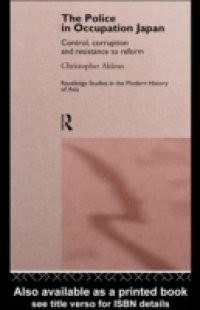Many Western commentators have expressed their admiration for the Japanese police system, tracing its origins to the American Occupation of Japan (1945-52).This study challenges the assumptions that underlie these accounts, focusing on the problems that attended the reform of the Japanese police during the Occupation. Drawing on a wide range of primary sources, Christopher Aldous explores the extent to which America failed in it's goal of 'democratizing' the Japanese police force, arguing that deeply-rooted tradition, the pivotal importance of the black market, and the US's decision to opt for an indirect Occupation produced resistance to reform. His study concludes with a consideration of the postwar legacy of the Occupation's police reform, and touches on a number of recent controversies, most notably the case of Aum Shinrikyo.

